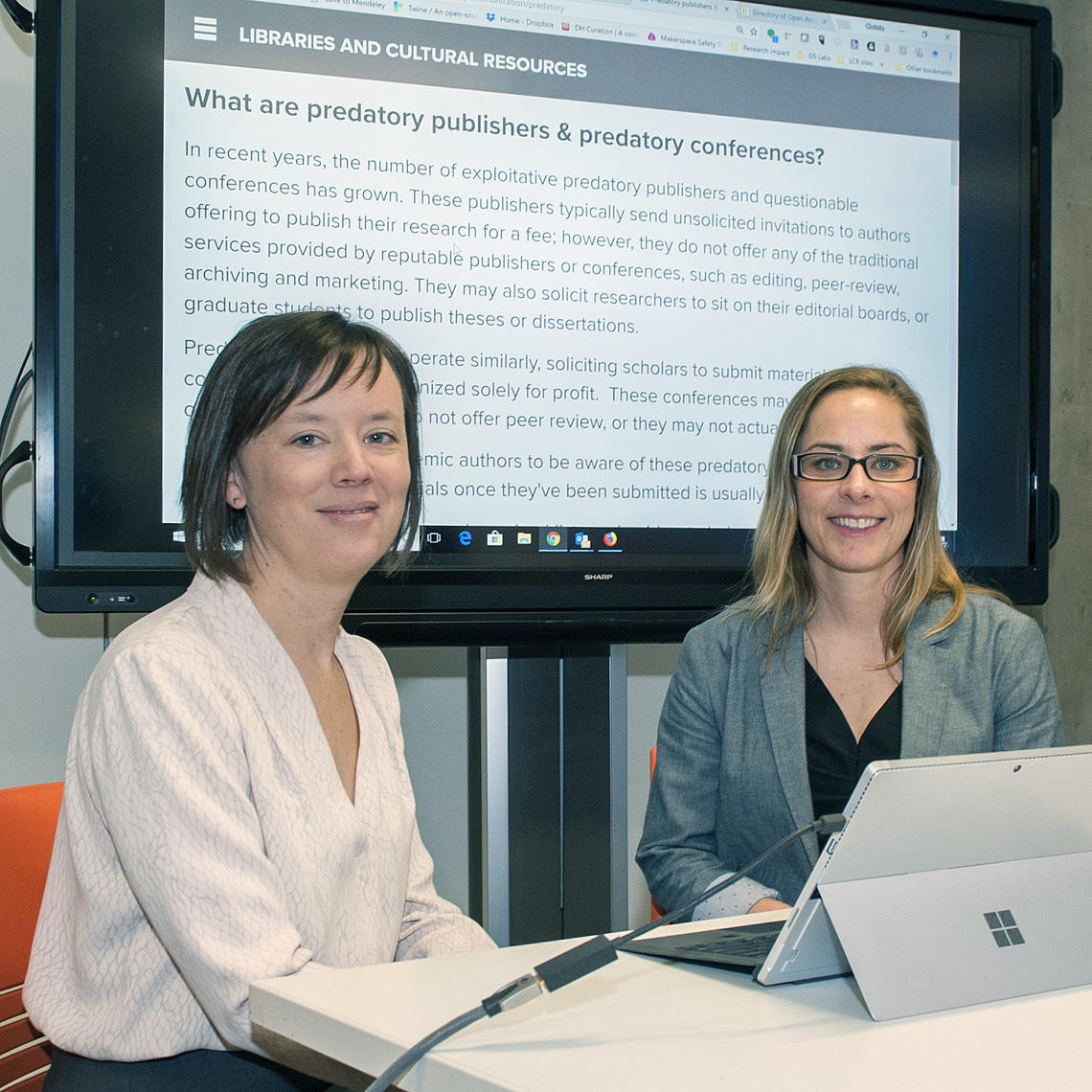March 16, 2018
Campus scholars warned about increasing problem posed by predatory journals and conferences

Christie Hurrell, left, and Rowena Wake.
Dave Brown, Libraries and Cultural Resources
At first, the journal seemed legit. What appeared to be a respectable academic journal in the field of social science and health solicited a paper from a widely published and respected faculty member at the University of Calgary. A small team of researchers made a submission. An undergraduate student, whose research formed the basis of the paper, was listed as the lead author.
It should have been a wonderful accomplishment for this student. But what happened next raised red flags.
“The editorial review process is normally quite rigorous, including queries about the research process and suggestions for structural changes to the article. This time there was absolutely no substance to the reviews at all. It was a very quick turnaround,” recalls one of the authors, Jenny Godley, associate professor in the Department of Sociology and a member of the O’Brien Institute for Public Health at the Cumming School of Medicine.
The unusual nature of the reviews prompted Godley and her colleague to investigate the journal further, and after finding it apparently indexed on a well-known search engine for research, they decided to proceed.
The article appeared online practically overnight, full of errors in formatting and with extra letters and characters that mysteriously appeared in the text. And the authors began to receive high-pressure demands from the publisher for US$1,500.
It’s not unusual for open-access journals, which are freely available online, to charge authors’ fees to cover publication costs. However, their suspicions about the journal’s legitimacy grew, and they attempted to withdraw the article. At that point, information about “withdrawal fees,” which had not been present before, appeared on the journal’s website. Furthermore, the journal didn’t correct the errors or take down the paper even after repeated requests from the authors.
“The article is still online to this day. The publisher refuses to take it down, and they continued to demand money for several months,” says Godley. “The fact that our paper remains online makes it impossible to try to publish it elsewhere in a legitimate journal. And there doesn’t appear to be any recourse.”
It didn’t turn out to be the reputable journal the researchers had thought it was in the beginning. Instead, this new publisher created a journal with a title closely resembling that of another journal — a respectable one — that had ceased publication. It’s a common trick in the world of what many academics have come to know as “predatory publishing.”
Libraries and Cultural Resources has created an online resource to help campus scholars spot shady publishers. Staff are also offering a workshop at 2 p.m. on March 19 in the Taylor Family Digital Library.
“This session is aimed at researchers at any stage in their careers, from undergraduate students to faculty members,” says Christie Hurrell, digital initiatives and scholarly communication librarian with Libraries and Cultural Resources. “Academic authors have a wide range of publishing options, and it’s important to understand the scope and to be able to identify traits associated with predatory publishers.”
The problem extends beyond publishing. Organizers of bogus conferences are also targeting the academic community at alarming rates. Predatory conferences solicit scholars to submit materials to events organized solely for profit. These conferences may be poorly organized and typically do not offer peer review. In some cases, they don’t take place at all.
Sarah Elaine Eaton, associate professor at the Werklund School of Education, recently identified this problem and developed a guide for graduate students entitled Avoiding Predatory Journals and Questionable Conferences.
“A graduate student of mine was being courted by a conference I had never heard of before. Upon further investigation with the assistance of librarian Bart Lenart in the Doucette Library, we determined the conference was questionable at best,” says Eaton. “Graduate students and academic staff need to know how to recognize when a conference or journal is questionable and when it is credible. Developing this skill is key for 21st century researchers.”
As for Godley and the questionable journal that published their paper, she remarks: “This paper represented months of work for that student, and I feel very badly because she’s the person most affected by this.”
